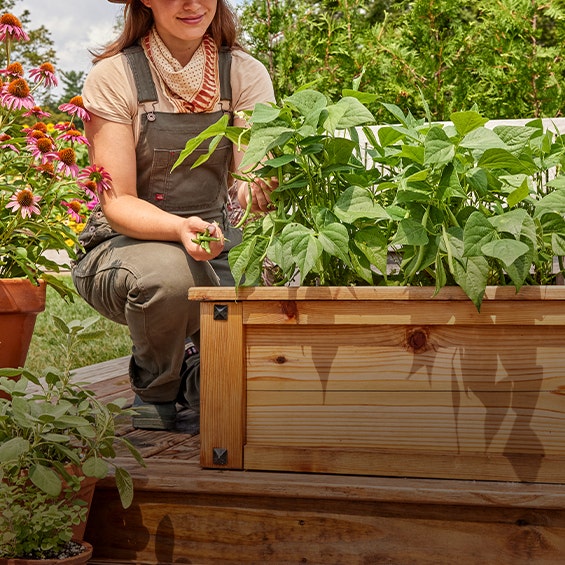
You may have heard that compost is an essential part of your garden's overall success. But what is it, exactly? If you're wondering how to use compost in a garden, when to add compost to garden soil, how to make your own and more, we've got you covered. Read on for everything you need to know to make and use compost to give your garden the ultimate boost.
What Is Compost?
Put simply, compost is decomposed organic matter. Garden compost should consist of five basic ingredients:
- Carbon sources
- Nitrogen sources
- Water
- Oxygen
- Microorganisms
The ideal ratio of carbon to nitrogen is anywhere from 25-to-1 to 40-to-1.
Bacteria, or microorganisms, help break down organic matter. Some people also like to add worms to aid the decomposition process, a practice known as vermicomposting.
All of these ingredients mix to form an optimal blend that breaks down into a final product similar to humus, which is the dark, organic matter found in soil as elements decay.
Why Use Compost?
Compost offers a host of benefits to your garden soil, and by extension, your plants. It improves the overall texture and composition of any type of soil. In particular, it helps sandy soil hold water and nutrients, and it enhances drainage in clay soil. It conditions soil with carbon and nitrogen, which feed your plants.
How to Make Compost
Making your own compost is a relatively easy way to supplement your garden and give yard and kitchen waste a second life.
First, decide what type of vessel you want to create your compost in. If you have ample space, you can create a large heap. Other options include holding units you can build yourself and pre-made composters that keep everything tidy and make mixing easier.
Next, add your ingredients in the 25-1 to 40-1 ratio. You don't need to add everything at once — you can continue to mix in ingredients as you rake leaves or produce kitchen scraps. To help your ingredients break down faster, make sure they're as small as possible before adding them. You can mow over leaves to shred them or chop up unused veggies before tossing them in the compost.
Keep your compost pile moist but not soaked.
Turn or mix the pile regularly using a garden rake or hoe to help keep oxygen circulating.
Watch the temperature: Compost should maintain temperatures between 90 and 140 degrees for optimal decomposition. If it's too warm, turn more frequently to release heat.
Be patient. Depending on the size of your pile, the size of the ingredients and the time of year, it can take several months to achieve the final "black gold" consistency. You'll know your compost is ready when it's transformed into a dark, crumbly, soil-like substance.
Get an in-depth look at how to create your own compost.
Common Compost Ingredients
While it's important to research whether a specific ingredient will work before putting it in your pile, traditional compost additions include:
Nitrogen Sources
- Vegetable scraps
- Coffee grounds
- Grass clippings
- Cow, pig, horse or poultry manure
Carbon Sources
- Leaves
- Shredded paper
- Straw
- Bark, wood chips or sawdust
Ingredients to Avoid
While it can be tempting to toss all your leftovers into your home composting pile, some things should stick to the trash can, such as:
- Animal products, such as bones, meat or pet manure
- Dairy products
- Cooking oils and oily foods, such as nut butters and dressings
- Weeds
- Disease- or pest-infested plant material
Other Ways to Source Compost
If you lack the space, patience or interest in composting at home, you can find good quality compost in other ways. First, check with your local waste management authority. They often accept yard waste from residents, create compost with it and then offer the finished product at a premium price. Landscaping and hardscaping companies also typically deliver compost by the truckload, and most garden centers sell compost by the bag.
How to Use Compost in a Garden
You can enhance soil throughout your landscape using compost in a myriad of ways. Include compost in your garden by:
Mixing it into the top 4 to 6 inches of native soil.
Sprinkling the compost around trees and shrubs as a mulch substitute.
Creating a 50-50 mix of potting mix and compost in containers.
Applying a thin layer over a freshly aerated lawn.
Burpee Tip: Avoid overapplying compost to the point that your soil becomes waterlogged. Also, keep compost away from plants that need lightweight, well-drained soil, such as lavender and salvia.
When to Add Compost to Garden Soil
While your garden can always benefit from compost, you'll want to apply it a few critical times of the year:
In the spring before planting, incorporate it into planting beds to replenish the soil from last year.
Midsummer, give tired soil a much-needed boost.
If you plant in the fall, add compost to give plants a healthy soil environment heading into winter.
Composting is an easy way to reduce waste and improve your soil's overall composition. Whether you make your own or buy it pre-made, apply compost to help give your plants the optimal growing environment.
Shop composters to help you create "black gold" minus the mess.



